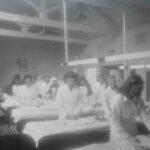 Wor Bella: star of World War One women’s football
Wor Bella: star of World War One women’s footballReview by John Pickard
“It generally comes as a big surprise to people that there were women’s football matches during World War One. Not only that, tens of thousands of people turned out to watch these selfless ‘munitionettes’ raise money for injured soldiers, widows and orphans”.
These are the opening words in the programme preface for Ed Waugh’s play, Wor Bella, which was on at the Clapham Bread and Roses Theatre in London, this week and which is moving on for the end of April to the Newcastle Theatre Royal, the biggest theatre in the city.
Wor Bella, is a marvellous piece of entertainment, describing the formation and runaway success of a particular women’s football team in Blyth, at the ground where Blyth Spartans still plays in the Northern section of the National League today. I won’t give away any spoilers, but suffice to say that in only a few short months Blyth Spartans Ladies became a formidable force in North East women’s football and Bella Reay was one of their stars.
They had the joy of playing before tens of thousands in St James’ Park, the home of Newcastle United, as well as at Ayresome Park, then the home of Middlesbrough FC. All of this was done to collect money for the injured, the maimed and the widows made by the war in France. There were, in fact, many “munitionette” teams up and down the country, but Wor Bella brings it to life through the eyes and the voice of one young woman in a solidly working class, industrial area.
Bella scored 133 goals in only 30 matches
Louise Taylor, one of the Guardian’s foremost sports writers, noted in her review of the play, “As fans began attending matches in their tens of thousands, female football superstars were born, perhaps most notably Bella Reay of Blyth Spartans Ladies. In scoring 133 goals in 30 matches – including a hat-trick in her team’s 1918 Munitionettes’ Cup final – the then 18-year-old “Wor Bella” possessed an eye for goal that Alan Shearer would have envied”. Again no spoilers, but the play actually has a short cameo from Alan Shearer.
Like all of Ed Waugh’s plays, Wor Bella is rooted in working class experience and is spoken in the local dialect. As always, Ed’s plays are full of humour, but also with some poignancy, as working people – in this case young women working in munitions factories and as dockers – put up with awful working conditions, but somehow fight their way through, with laughter, determination and not a little working-class solidarity.
Ed Waugh is a life-long socialist and all of his plays, like Haddaway Harry, Carrying David, and the Great Joe Wilson, are shot through with descriptions of episodes and the daily lives of working class people. The characters have an authenticity appreciated by mostly working class audiences and they are always unmistakeably political, unless you only listen with half your brain switched on.
In Wor Bella, for instance, there are many allusions to the pointless sacrifices (by workers again) of the war and the life of women workers. The words of Bella clearly mark the disgraceful attitude of government and employers and quite a few of the menfolk, towards women workers.
A sense of liberation and independence
These “munitionettes” – even that has a patronising ring to it – were ‘good enough’ to do hard and dangerous work for the war effort, but never ‘good enough’ to get the same pay as men doing exactly the same job. Despite the privations of the war, Bella, like other women, experienced a sense of liberation and freedom because of the (relatively) high pay in war work, and by the relative independence it gave the women, although a lot of that was lost when the war was over.
As an aside, one of Bella’s team-mates, Mary Lyons, became the youngest-ever man or woman to play (and score) for an England team, at not quite 16 years of age. To be more precise, it was the North of England women against the West of Scotland .
After the Armistice in November 1918, most of the women in the Blyth Spartans team gave up football, often going off to get married and have families. In any case, the Football Association, to its eternal disgrace, banned women’s football, a ban that continued right up to 1971. Bella herself, incidentally, gave up football after a few games post-1918, and lived to a ripe old age, dying in 1979.
Long overdue review in the Guardian
For exiled Geordies living in the South, it is a great pity is that most of Ed Waugh’s productions are in North East venues and they only occasionally come south of Doncaster. Wor Bella actually came out two years ago, but it was only put on in London this week. But it is also long overdue that Ed has some national recognition for his excellent output of plays, so the review of Wor Bella in the Guardian two weeks ago was welcome.
After Wor Bella, Ed Waugh’s next venture is the Cramlington Train Wreckers, a reference to the striking miners from the village of Cramlington in Northumberland, who derailed the famous Flying Scotsman train during the 1926 General Strike. Train Wreckers is showing at many venues in the North East this coming November and you can find details here.
Read aboutWor Bella here. The play is on the Theatre Royal, Newcastle, the weekend of April 27 and 28. If you haven’t got your ticket, book one now, here.
 Wor Bella: star of World War One women’s football - Review by John Pickard “It generally comes as a big surprise to people that there were women’s football matches during World War One. Not only
Wor Bella: star of World War One women’s football - Review by John Pickard “It generally comes as a big surprise to people that there were women’s football matches during World War One. Not only Letter: Attack on Diane Abbott – race and class - By Mark Langabeer – Member of Hastings & Rye Labour Party As has been widely reported, Frank Hester, who has donated £10 million to Tory
Letter: Attack on Diane Abbott – race and class - By Mark Langabeer – Member of Hastings & Rye Labour Party As has been widely reported, Frank Hester, who has donated £10 million to Tory Institutional Racism in the French Republic - By Greg Oxley, Editor, La Riposte Over the recent period, governmental propaganda in France has once again brought fear and suspicion against Muslims to the
Institutional Racism in the French Republic - By Greg Oxley, Editor, La Riposte Over the recent period, governmental propaganda in France has once again brought fear and suspicion against Muslims to the There is always hope! – Community vs mining bosses in Turkey - Ray Goodspeed introduces a video from Turkey – “There is Always Hope: Story of İkizköy“ (photo – still from video) This short video (13 minutes
There is always hope! – Community vs mining bosses in Turkey - Ray Goodspeed introduces a video from Turkey – “There is Always Hope: Story of İkizköy“ (photo – still from video) This short video (13 minutes Institutionalisation and Repatriation: A cruel solution to the “problem” of unmarried mothers - Dr Lorraine Grimes, of Maynooth University, in Ireland, examines the scandal of the repatriation of thousands of unmarried women and girls from Britain to Ireland
Institutionalisation and Repatriation: A cruel solution to the “problem” of unmarried mothers - Dr Lorraine Grimes, of Maynooth University, in Ireland, examines the scandal of the repatriation of thousands of unmarried women and girls from Britain to Ireland

